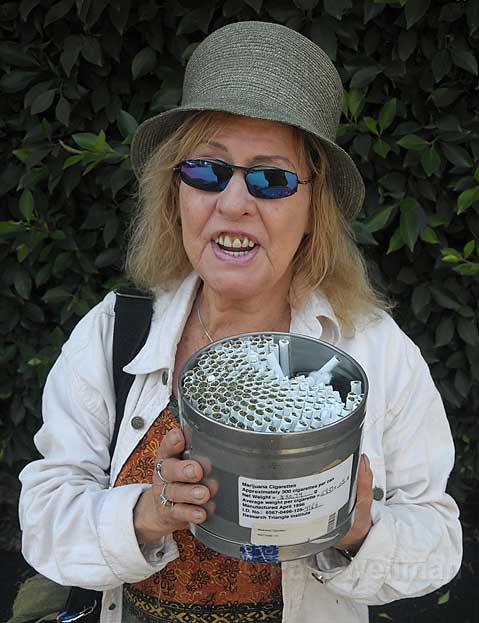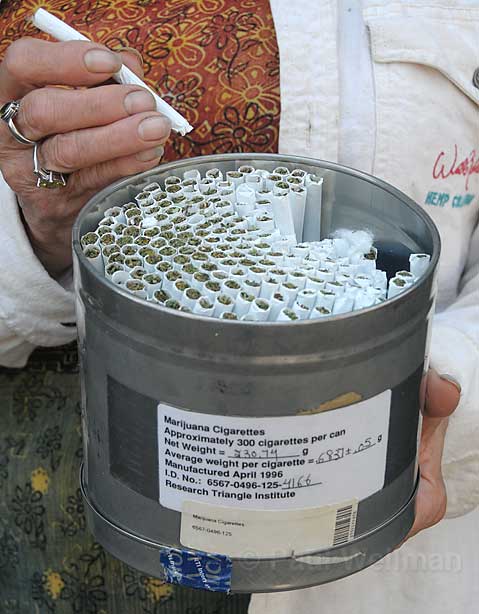Federal Cannabis Patient to Lead Medical Marijuana March
Elvy Musikka Arrives for Wednesday March to Protest Federal Government's Threat to Close Santa Barbara Dispensaries

At noon on Wednesday, August 27, dozens of medical marijuana patients and proponents are expected to gather at the dolphin statue near Stearns Wharf and walk up State Street toward the County Courthouse. They’ll be protesting the recent threats by the federal government to punish Santa Barbara landlords who rent to state- and city-sanctioned cannabis dispensaries. The federal crackdown in Santa Barbara is the latest battle in the long-simmering war over medical marijuana, a state’s rights showdown in which voters and lawmakers from California and other states have deemed the drug legal for patients but the feds continue to consider it an illicit, medically useless substance.

Leading the charge on Wednesday will be Oregon’s Elvy Musikka, one of the few Americans provided marijuana by the federal government for medical reasons. Musikka, who’s used the ancient herbal remedy to treat glaucoma for more than 25 years, is one of the most compelling cases cited by cannabis-as-cure advocates to show how the drug helps sick people. And, explained march organizer, dispensary founder, and T-shirt manufacturer Mark Russell on Tuesday, Musikka and her tins full of government-grown marijuana cigarettes are also the best examples to show why the feds’ crackdown on medical marijuana dispensaries is unwarranted, hypocritical, and harmful to patients. Musikka brought one such tin – which held 230.74 grams of low-grade marijuana grown by the University of Mississippi and rolled into 300 or so joints – by The Independent‘s offices on Tuesday, and argued that locally operating dispensaries are the best way for any patient to obtain medical marijuana.
The march comes at a crucial time for dispensaries in Santa Barbara. Earlier this year, the City of Santa Barbara – whose citizens overwhelmingly voted in 2006 to make all marijuana enforcement the lowest police priority – followed the lead of other California cities in passing an ordinance to accommodate and regulate the numerous medical marijuana distributors that began setting up shop in town a couple years ago. The shops are deemed legal by California law because in 1996 voters passed Proposition 215 to allow for sales of medical marijuana, a move that was further explained and strengthened by the State Assembly’s passage of bill 420 in 2003.
But earlier this month, representatives from the federal Department of Justice and Drug Enforcement Administration met with the owners of buildings that house cannabis dispensaries and threatened to use federal racketeering laws to confiscate the properties if the cannabis dealers were not evicted. Since then, most if not all of the dispensaries in Santa Barbara have received eviction letters and some are already clearing out.
Then on Monday, August 25, the state’s Attorney General Jerry Brown issued an 11-page legal opinion on the statewide matter, giving guidelines to help California law enforcement and local governments determine which are legal cannabis dispensaries and which are not. Brown said that he hoped these guidelines would also convince the federal government to stop their crackdowns, telling the L.A. Times, “Hopefully the feds will back off in instances where people are really following these guidelines.” But Brown’s “road map” also explained that those dispensaries only in the business solely for profit – and not properly registered as caregiving collectives – are likely breaking the law. It’s unclear how that distinction would play out on the streets of Santa Barbara.
Wednesday’s march takes place amid this ongoing state versus fed battle, and organizer Russell said he sent out a press release to more than 20 different media outlets. He was hoping for as many as 500 marchers when he announced the march last week, but more realistically expects a number between 50 and 100.

The protesters, who have promised to be nonviolent and follow traffic laws, will be carrying signs and wearing shirts that say “I Am Not a Criminal” on the front and “No Access Is Not a Solution” on the back. They will also be collecting signatures and arranging a text message network to get the word out if the feds do raid a Santa Barbara cannabis club. That way, Russell explained, the feds will know they’re being watched if they start raiding state-sanctioned and city-approved dispensaries.
The march starts at noon on Wednesday, August 27, at the dolphin statue at the foot of Stearns Wharf.



